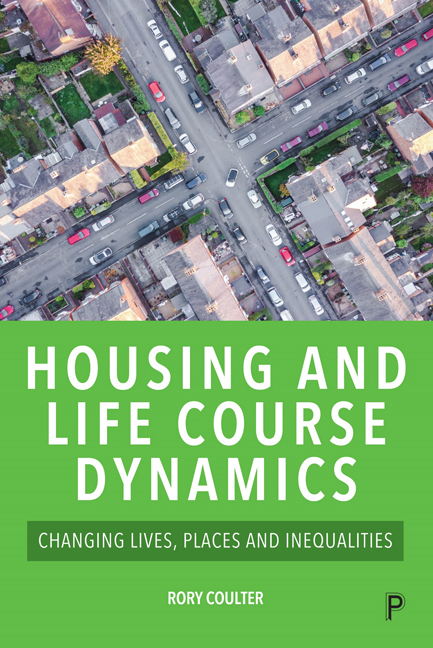Book contents
- Frontmatter
- Dedication
- Contents
- List of figures and tables
- List of abbreviations
- Notes on the author
- Acknowledgements
- Preface
- 1 Introduction
- 2 Housing: a life course perspective
- 3 Households and families
- 4 Learning and training
- 5 Employment and money
- 6 Health, well-being and care
- 7 Changing places
- 8 Understanding housing and life course dynamics
- Notes
- References
- Index
2 - Housing: a life course perspective
Published online by Cambridge University Press: 18 January 2024
- Frontmatter
- Dedication
- Contents
- List of figures and tables
- List of abbreviations
- Notes on the author
- Acknowledgements
- Preface
- 1 Introduction
- 2 Housing: a life course perspective
- 3 Households and families
- 4 Learning and training
- 5 Employment and money
- 6 Health, well-being and care
- 7 Changing places
- 8 Understanding housing and life course dynamics
- Notes
- References
- Index
Summary
This chapter lays the book's conceptual foundations. After sketching three of the most influential disciplinary perspectives on residential behaviour, the chapter then reviews the specific conceptual approaches scholars have developed to understand how people move through housing systems as they pass through life. It contends that none of these approaches can fully describe or explain how housing is embedded into 21st-century lives. The chapter then moves on to outline a more modern life course framework which can provide new insights about contemporary residential processes and inequalities. The latter portion of the chapter develops this framework by revisiting five core principles of the life course perspective and using them to derive twelve conceptual tools which can be applied to better understand residential behaviours (Elder et al, 2003). These flexible tools are then used throughout the subsequent chapters to integrate and synthesise what we know about contemporary housing and life course dynamics.
Contrasting traditions
Three disciplinary traditions have most strongly shaped our understandings of residential behaviour. Of these, the economic tradition has been the most influential. Economic research has drawn heavily on neoclassical thought and its central assumption that people are rational actors who make utility optimising decisions after calculating the costs and benefits of different options. This rational choice framework has been applied to understand many demand-side housing processes, including:
• households matching themselves to suitable dwelling vacancies (Wheaton, 1990);
• residential adjustments around life events such as childbirth or unemployment (Rabe and Taylor, 2010);
• how variations in housing market conditions impact on household formation and residential mobility (Ermisch, 1999; Ferreira et al, 2010);
• the effects of income, house prices, housing supply and macroeconomic conditions on tenure and locational decisions (Andrew, 2012; Ermisch and Washbrook, 2012).
The hegemony of neoclassical models is now waning under the challenge of behavioural economics. Behavioural approaches use psychological evidence to explain why people systematically deviate from the predictions of neoclassical theory (Gibb, 2012). Although the psychological explanations for these deviations are complex, perhaps the most important are that people are loss averse (more sensitive to losses than identical gains) and tend to use a range of heuristics – defined as simplified cognitive tools – when making demanding decisions (Morrison and Clark, 2016).
- Type
- Chapter
- Information
- Housing and Life Course DynamicsChanging Lives, Places and Inequalities, pp. 21 - 51Publisher: Bristol University PressPrint publication year: 2023

